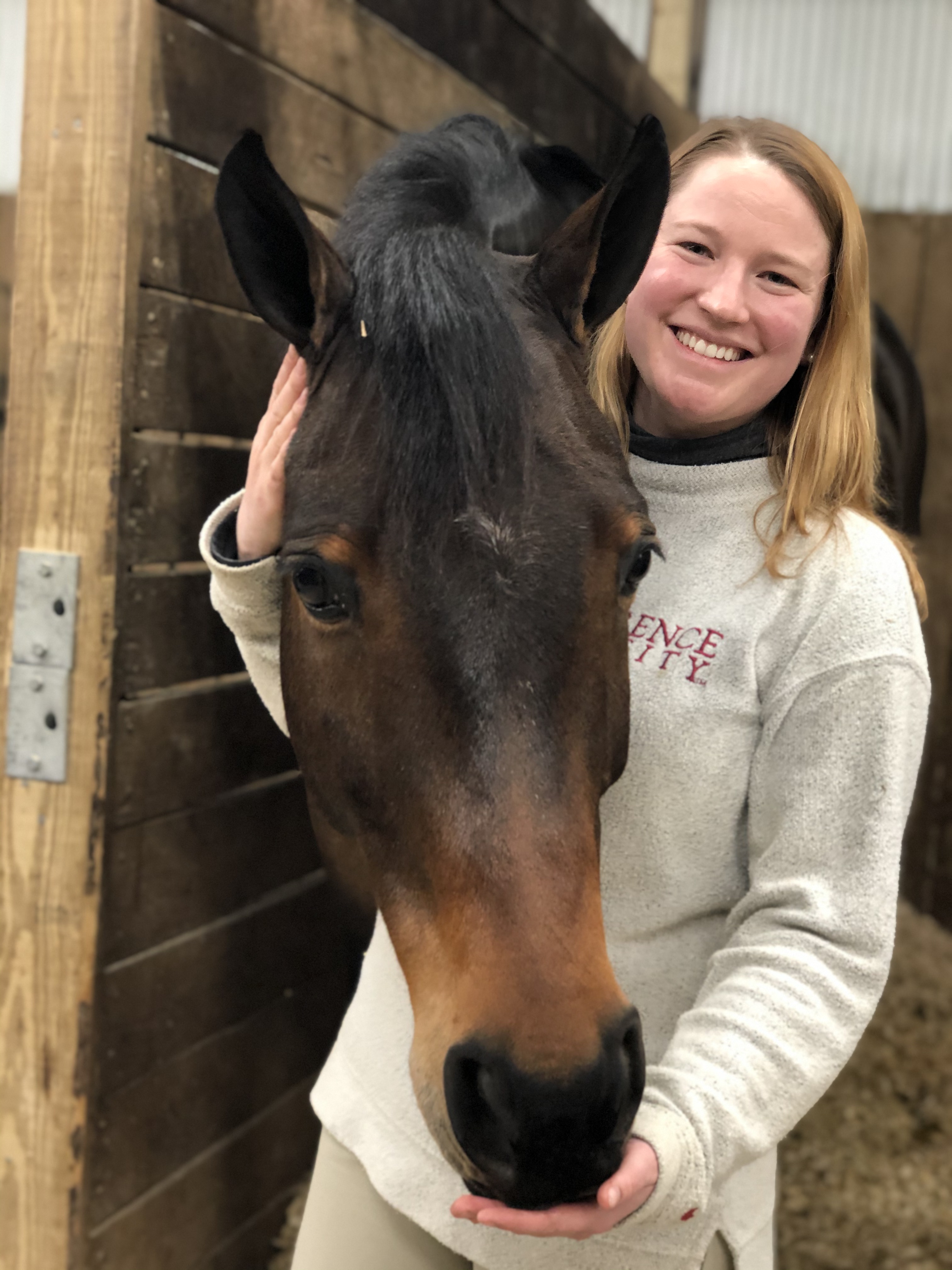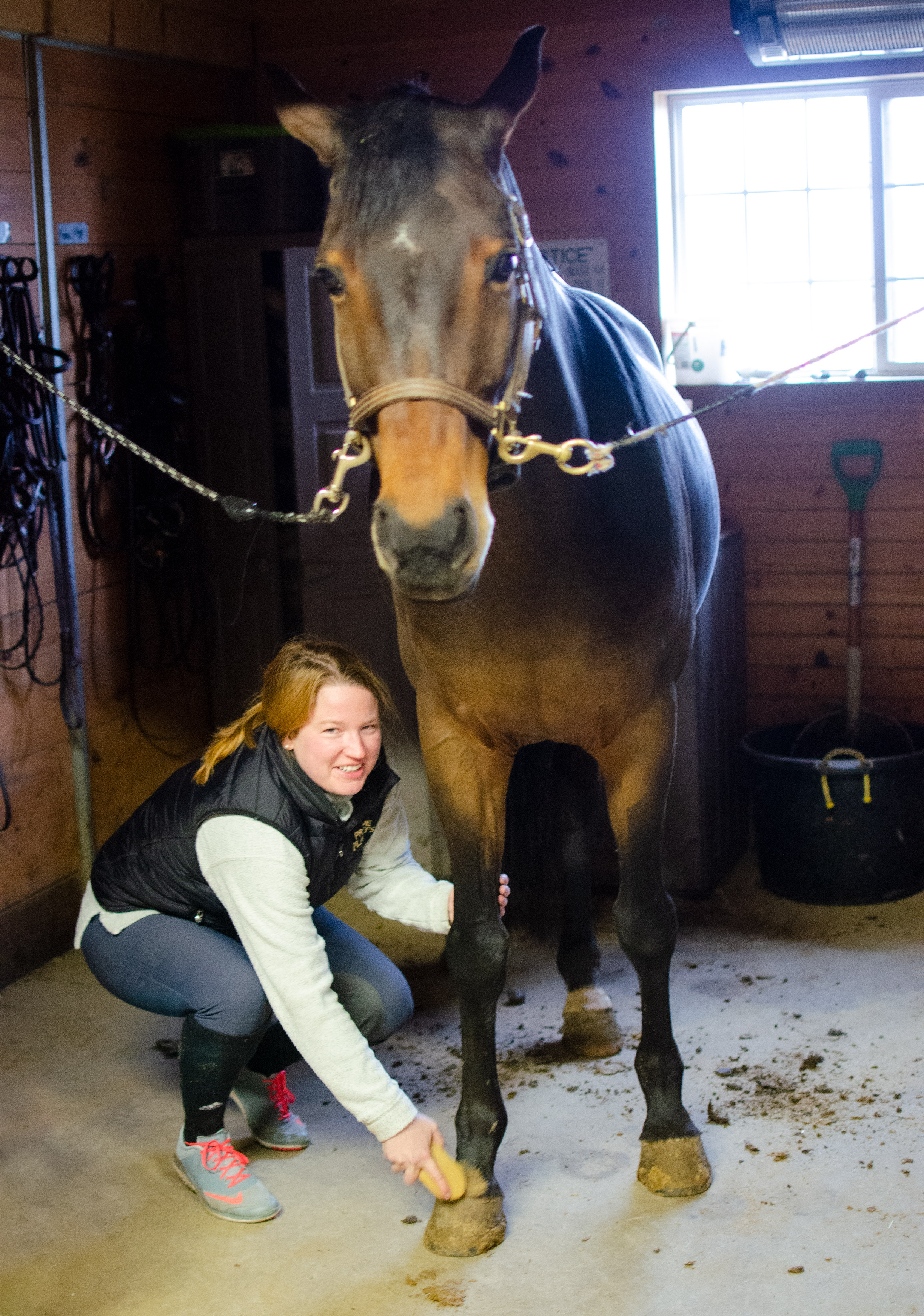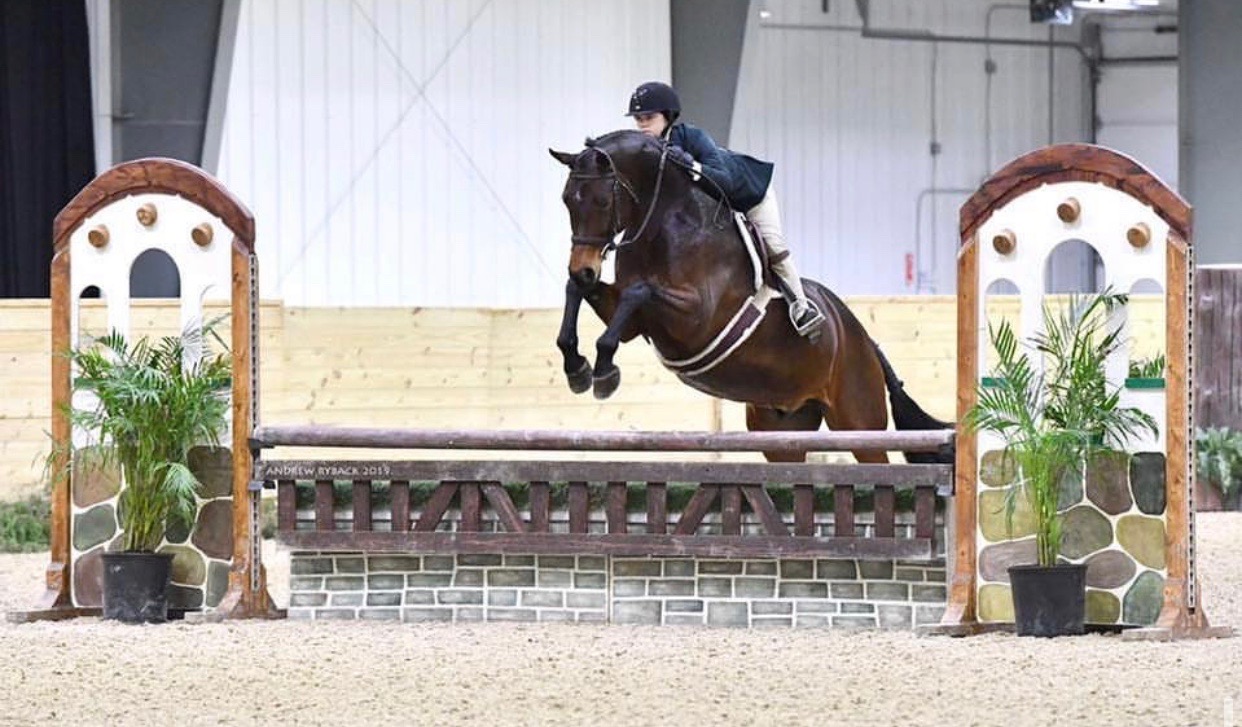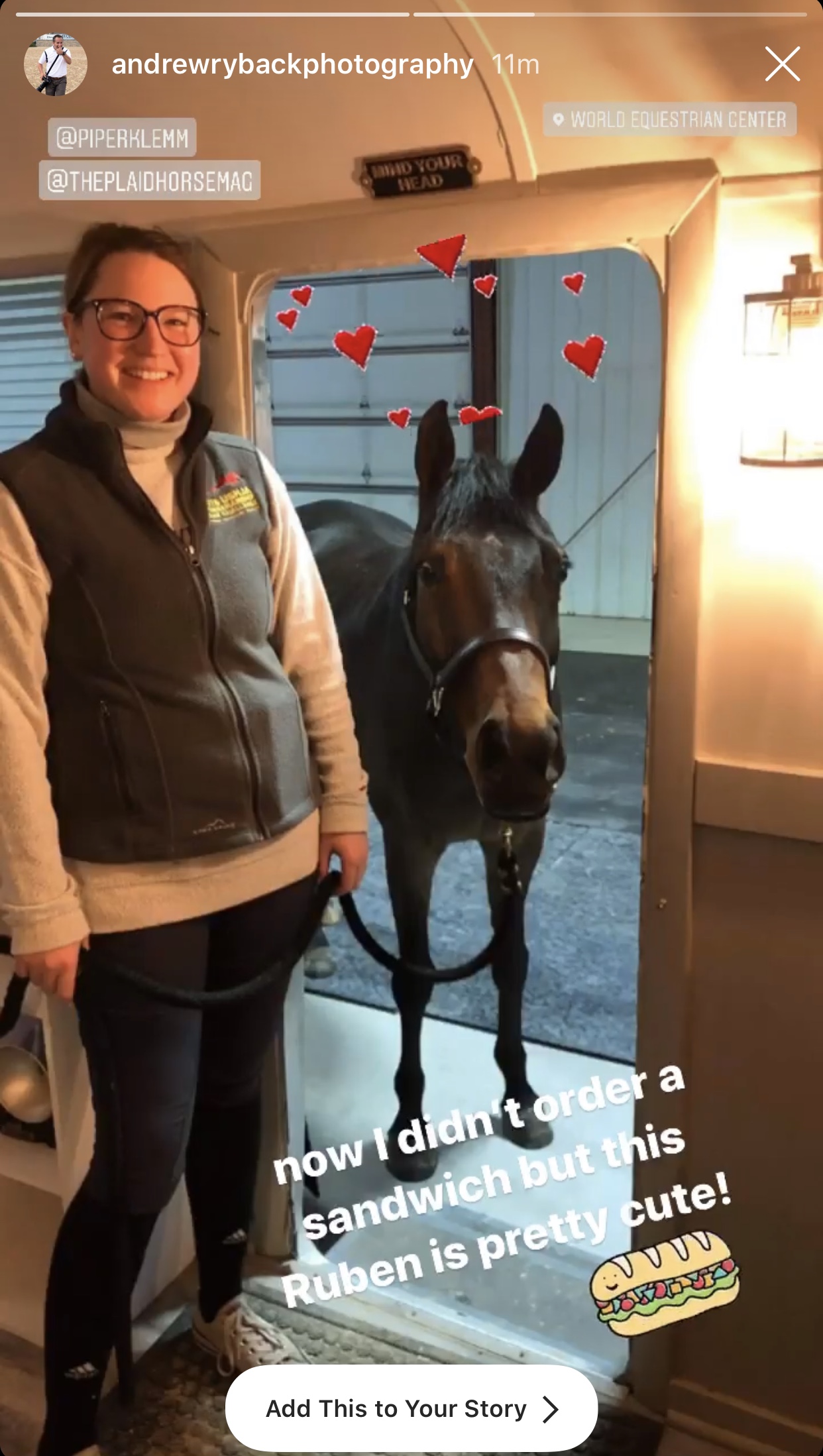
This Sunday’s Spotlight lands on our friend, the passionate, driven, incredibly successful owner of The Plaid Horse magazine, Piper Klemm. Piper is a mogul in the horse industry, running her well-respected company and keeping education, kindness and inclusivity at the forefront of every venture she tackles. This week, Piper and her adorable ‘Reuben’ made their way to World Equestrian Center. Piper took time to chat with us about the industry and how she found herself riding horses and Reuben was sweet enough to offer up some sweet snuggles in the process.
WEC: How did you get into riding?
Piper: My parents love to tell this story. When I was about three years old I went to a friend’s birthday party and they had a pony for the kids to ride. There were thirty kids at the birthday party and everyone got a turn on the pony, then about ten kids lined up for a second ride, then about three kids lines up for a third ride, and then there was one kid left on the pony – me. I didn’t want to get off of the pony for presents or cake. They had to make me get of the pony when it was time for it to go home. From there I just begged my parents to ride.
When I was seven years old, I finally wore my parents down. My parents weren’t horse people and didn’t know anything about horses, so they opened the phone book and found a barn for me to ride at in the yellow pages. I’m originally from a town called Millbourne just outside of Philadelphia. It’s great horse country there. Radnor Hunt is there and I was in Radnor Hunt Pony Club. There are a lot of great local horse shows. Devon is right there, too, so we were always able to get a glimpse of the big league.
We connected early on with a really amazing trainer, Shirley Fox. We didn’t know anything at the time and she took all of the time in the world to teach us how the sport worked and how all of the divisions worked. She really fostered my love of projects and puzzles in young ponies and green ponies. I couldn’t be more grateful for the foundation she gave me.
WEC: Tell us about some of the horses you rode growing up.
Piper: I rode anything and everything. I rode a lot of ponies. I got my own pony as an unbroken two year old and started her. When other people saw that I did that, I got to ride a lot of really young ponies. A lot of people really supported me. I got to show a little bit, but not a ton. I took pretty much any opportunity I could to get on. I groomed a lot and went to a lot of places and a lot of horse shows doing that. I did as much as I could myself and I got to see a little bit of everything. I never really had success in the show ring. Some of the ponies made it up to WEC-type shows, then they were sold or leased.
I got to learn a lot of great business. My parents had me run my first pony like a business. I had to keep track of every expense, mileage to the barn, every shoe…everything. Research shows that kids that grow up bilingual are a bit worse at both languages until about age five, then it pays off and they’re at grade level in both languages. I feel like that was like me with the horses. I had such a broad and interesting start in the horse community that I don’t think I was good at anything during my Junior years. It took me a while to put everything together and make all of the connections.
WEC: Where have you found your happy spot in the horse industry?

Piper: I found my happy spot through working with really great trainers. I’ve learned that I like doing anything with my horse with certain people. I ride with Traci and Carleton Brooks at Balmoral when I’m on the West coast and with Emily Elek of Stonewall Ponies in the Midwest. I would rather jump two feet forever working with them than anything else. All three of them are geniuses. They’re great teachers and they have put so much time into understanding the animals. I just want to be around their genius and their teaching style. I feel comfortable and I understand them. This is a life-long learning sport and I would rather be with them doing literally anything than just wanting to do the Amateur Owners or something. Of course, one day I hope to get to that level, but that’s not right now and I’m just learning and enjoying it.
WEC: Tell us a little about your horse.

Piper: His name is MTM Sandwich, or Reuben. He is the kindest animal I’ve ever met. He’s kind about literally everything. He tries really hard all of the time. I got him about a year ago. It was a little bit of a slow start. he hadn’t really done much Amateur stuff before. Lexi Miller who does my ponies with Emily helped to put a lot of buttons on before I really started riding him, like teaching him how to chip and that it’s okay. Making a really good Amateur horse is a lot like making a pony because you have to teach them that, no matter what mistakes your human makes, you have to be strong and confident and happy. Reuben is incredibly stridey, scopey and athletic, but he had always been ridden by really good people who taught him how to do it perfectly. He never really had the uncertainty of an Amateur. Lexi and Emily do that on all of the young ponies and they were able to teach Reuben. He’s so forgiving, he just needed a few more tools. I started really riding him this Summer and we showed for the first time in Kentucky. Then we did the Minnesota Harvest Festival and Ledges last month, now we’re here at World Equestrian Center.
WEC: Tell us about you.
Piper: I’ve owned The Plaid Horse since 2014. My background is in Chemistry and Biophysics. I have a PhD from Berkeley. I’ve always been an educator and looked at different systems. Horses have always been my passion and I think a lot of the same things apply. Not many people can have an academic approach to this industry just because of the nature of it. It’s been interesting. Within The Plaid Horse, we have a network that has an app on Roku and Apple TV that has static educational content, we have our blog where we put out daily material, we put out nine issues of the magazine per year and we publish books. We published three books called Show Strides this year that were a collaboration between Rennie Dyball and me. They’re young rider, middle-grade books to learn about the industry.
We’ve had a lot of success with educational material and inclusivity. I think World Equestrian Center is really great about inclusivity, but overall I think our sport has struggled with it. To me, it’s really important to be in a place where everyone can ask questions and learn without being afraid of being judged for it. This place provides such a great opportunity for people to learn, try new horses, get to know a new animal and all of that. I really appreciate it because there aren’t many places in the country where you get classes with huge scores that are very competitive that are still very inviting. A lot of places are one or the other. It’s really cool to be in a place that’s really conducive to both.
I’m also teaching a class at St. Lawrence University this Summer. I’ve taught a few regular college classroom courses at St. Lawrence, but this one is for the equestrian industry. It’s an online only course and I have worked with them to make it open enrollment so that we can have high school students and college students at other colleges getting credit. Anyone can take it. It’s about the equestrian business and the niche things that are specific to our market and our industry. I’m trying to get the stuff that I learned the hard way out there so that no one else has to learn it the hard way. I hope the next group of people can stand on the shoulders of a little more data and make better decisions based off of that. I’m really excited about the course.
WEC: How do you balance work and riding?

Piper: (Jokingly) Terribly. Part of getting my own horse was trying to make riding more of a priority. I get stuff done by using tunnel vision, and that’s not sustainable or healthy. That kind of balances it out. It’s also hard because my hobby and my work are so blended. I can go to a horse show that’s for me on vacation, but I’m still working. Reuben lives with Emily in Wisconsin and I don’t ride very much. I either fly out or horse show about once per month, but that’s more than I actually was riding before. In the Winter I can ride a little bit more consistently because I usually go out to Thermal for the Winter and I can ride at Balmoral. At the end of the day, I’m at the stage of my career where every minute of investment counts and I have sacrificed a lot of riding to put my career first because I think now is the time to do that. I do think my career comes first, but now that I have a really special horse in my life I’m trying to make decisions that get me riding more. I know a lot of people are able to ride every day, but I travel forty nine weeks per year, so I don’t ride every week. I do my best here and there and I forgive myself for where I can’t and I have a horse that forgives me for where I can’t.
I also have investment ponies with Emily. I still own my first pony from when I was a kid. I’ve gotten a number of other ponies and it’s a great business for me, but it also gives me the opportunity to support the sport. Emily starts a lot of young ponies and she gives young people the tools to ride. I want to support that. She comes to a place like WEC without grooms and the kids do everything themselves. It takes a lot of time. She takes her time to teach all of them and that’s what I want to support. She makes a lot of really great riders and participants in the sport. She’s always trying to think about it from the pony’s perspective. It’s an educational program that I really believe in.
WEC: Do you have any New Year riding goals?
Piper: My New Year’s resolution last year was to be more consistent and I think I really did that. I’m the one who makes the nebulous resolutions because I think that life is more complicated and tactile than that. My goal this weekend at the horse show was to love my horse more on the way home than I did on the way here and I think that I achieved that. Other people say that’s a nebulous goal, but I achieved it! He makes me feel brave and that’s the only goal I need for riding.
My goal consistently is to take advantage of every opportunity the best that I can. I also think that my goal is going to be to simplify stuff a little bit and maybe try to do a few less things a little bit better. When you’re young and trying to kick down the door for any opportunity, you feel like you have to climb every wall that comes your way. As you get older and opportunities are more flowing, collecting projects becomes the next challenge. I think I got really good at clamoring for every project and I haven’t gotten as good as I want to be yet at selecting. I’m working on that right now.
I hope we can all work together this year to be more kind and caring. This sport is hard enough. We don’t need to be anything other than supportive to each other. That doesn’t mean lessening the hard work and high expectations and I think that balance is hard. If we all are committed to it, then we can make strides in that direction. I do think that the sport is so much more inclusive and kind than it was a number of years ago. I do see it moving in the right direction.
Great talking with you Piper! We wish you and Reuben the best of luck both in and out of the show ring!
Photos coutesy of Piper Klemm.

